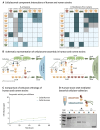Cryptic diversity of cellulose-degrading gut bacteria in industrialized humans
- PMID: 38484069
- PMCID: PMC7615765
- DOI: 10.1126/science.adj9223
Cryptic diversity of cellulose-degrading gut bacteria in industrialized humans
Abstract
Humans, like all mammals, depend on the gut microbiome for digestion of cellulose, the main component of plant fiber. However, evidence for cellulose fermentation in the human gut is scarce. We have identified ruminococcal species in the gut microbiota of human populations that assemble functional multienzymatic cellulosome structures capable of degrading plant cell wall polysaccharides. One of these species, which is strongly associated with humans, likely originated in the ruminant gut and was subsequently transferred to the human gut, potentially during domestication where it underwent diversification and diet-related adaptation through the acquisition of genes from other gut microbes. Collectively, these species are abundant and widespread among ancient humans, hunter-gatherers, and rural populations but are rare in populations from industrialized societies thus indicating potential disappearance in response to the westernized lifestyle.
Conflict of interest statement
Figures






References
-
- Freeman HJ, Spiller GA, Kim YS. A double-blind study on the effect of purified cellulose dietary fiber on 1,2-dimethylhydrazine-induced rat colonic neoplasia. Cancer Res. 1978;38:2912–2917. - PubMed
Publication types
MeSH terms
Substances
Grants and funding
LinkOut - more resources
Full Text Sources
Medical
Molecular Biology Databases

